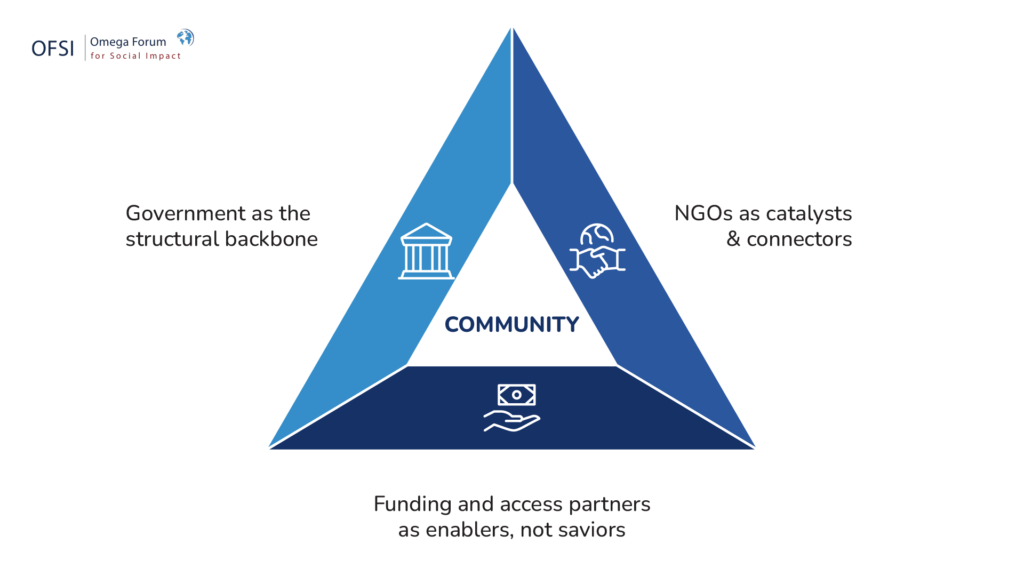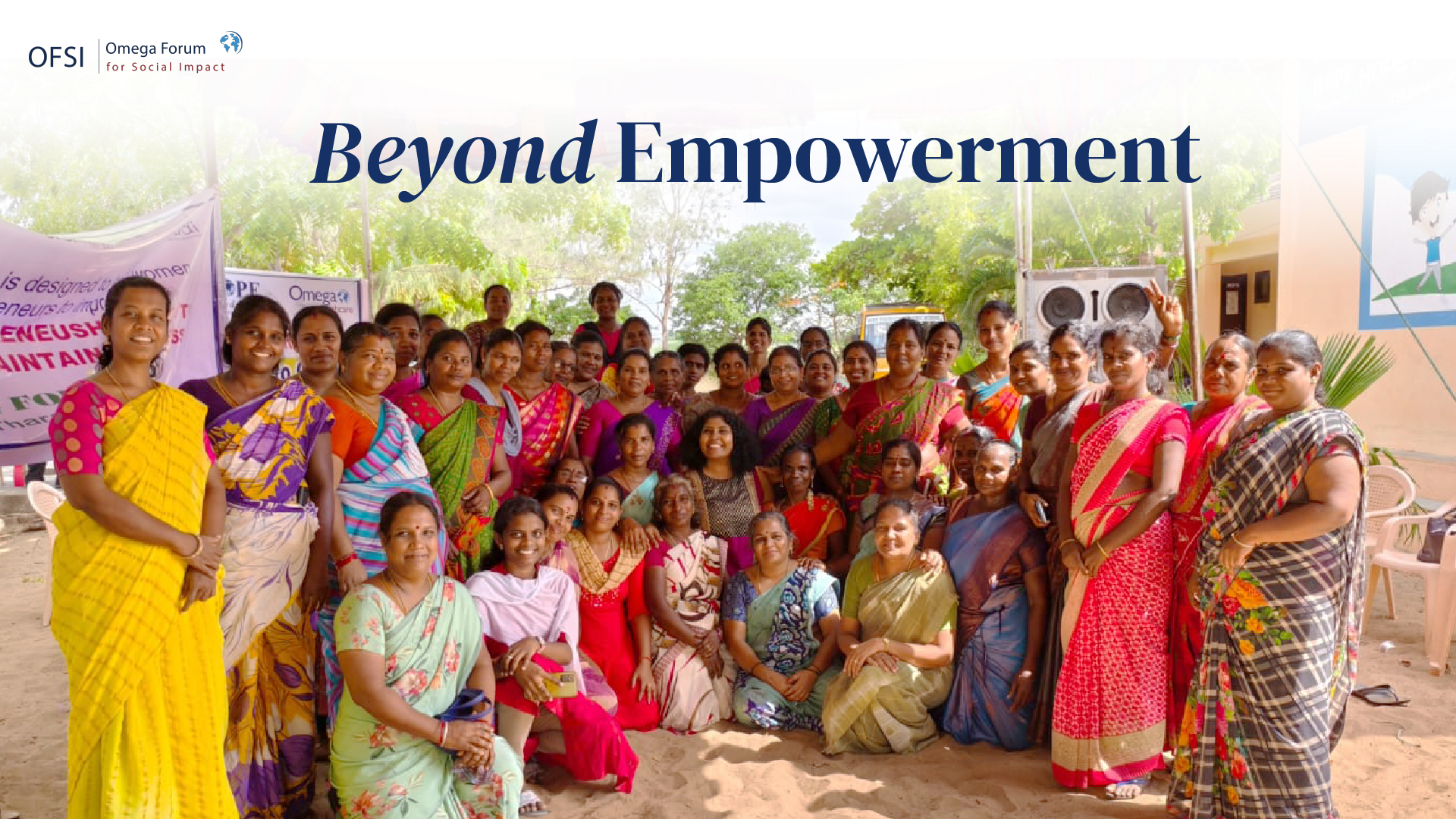One of the most transformative journeys in my life has been realizing that genuine community change is not a matter of what we give but of how we work with people. Over time, I have come to question the prevailing narrative around “empowerment” and whether it serves communities in the way we intend. Empowerment, as commonly framed, can often imply an imbalance—one where power is transferred rather than shared. Instead, I now view empowerment as a collaborative journey, one that focuses on enabling access and unlocking potential through a partnership framework.
In this context, I would like to introduce a framework we often use at OFSI—the Golden Triangle of Development—designed to structure sustainable community development. This term, close to the heart of OFSI, involves three primary stakeholders: NGOs, Funding and Access Partners, and Government entities. Each of these partners holds a unique role in community development, while the community itself occupies the central space, signifying its role as both the beneficiary and the central agent of change.
Placing the Community at the Center: A Paradigm Shift
Central to this framework is the acknowledgment that communities are not passive recipients awaiting external intervention. Rather, they are composed of individuals, families, and groups with intrinsic strengths, local knowledge, and self-determined goals. This shift calls for a recalibration in approach—where we do not aim to “fix” communities but rather to provide them with the resources and access required to actualize their potential.
One experience that resonates with me occurred during a visit to a tribal village near Chengalpat, where I observed women managing roles as caregivers, providers, and community leaders. The absence of structured support systems in their daily lives became evident, yet so did their resilience and resourcefulness. This experience reinforced that sustainable development does not stem from prescriptive solutions but rather from co-created pathways, driven by the community’s identified needs and aspirations.
Conceptualizing the Golden Triangle of Development
The Golden Triangle of Development, a conceptual framework developed by OFSI, is an emerging theoretical approach to sustainable community development. It posits a balanced, multi-sectoral engagement model that empowers communities through collaborative, not directive, efforts.

- NGOs as Catalysts and Connectors
NGOs play an integral role by serving as catalysts and connectors in the development process. They bring domain-specific expertise, a deep understanding of ground realities, and operational capabilities to bridge communities with essential resources. Their role, however, extends beyond the mere delivery of services. Effective NGOs take on a role of facilitation, focusing on what the community itself has articulated as priorities rather than imposing an externally defined agenda. - Funding and Access Partners as Enablers, Not Saviors
Funding and access partners provide the critical financial and material resources that fuel community projects. However, research and practice increasingly show that genuine impact arises when funders adopt a supportive, partnership-driven approach rather than one that prescribes solutions. Here, funders enable communities by investing in their own ideas and capabilities, a concept that aligns with global best practices in trust-based philanthropy. - Government as the Structural Backbone
Government institutions are indispensable in creating the infrastructure and policy frameworks necessary for long-term success. Governments bring authority, regulatory frameworks, and scalability that cannot be achieved by NGOs and funders alone. Their engagement can institutionalize community-driven solutions, allowing them to extend beyond pilot phases into durable, region-wide impacts.
At the heart of this triangle lies the community, representing a paradigm shift in our understanding of development. When each partner within the triangle upholds a collaborative, egalitarian approach, the system remains in equilibrium—allowing sustainable community development to evolve organically and in alignment with local contexts.
Maintaining Equilibrium: A Delicate Balance for Lasting Impact
The crux of the Golden Triangle of Development framework is in maintaining a delicate balance. Consider a tripod: each leg works in concert to provide stability, and if one leg dominates or falters, the entire structure risks collapse. Similarly, if one stakeholder within this triangle becomes disproportionately influential, the resulting initiatives may fail to serve the community effectively.
Another essential aspect of maintaining this balance is flexibility—the ability to adapt to challenges and revisit strategies. Sustainable development requires an ongoing commitment to understanding the unique problems and aspirations of each community. If program milestones or outcomes are not being met, it is crucial to revisit the whiteboard, analyze the barriers, and collaboratively realign priorities rather than halting funding or disengaging abruptly. This approach reinforces trust and ensures that programs remain community-driven and outcome-focused.
Toward a Model of Equal Participation and Shared Responsibility
For this model to succeed, each partner must acknowledge their role as one part of a larger, interconnected system. NGOs must understand that they are facilitators, not sole drivers, of change. Funders must approach development with humility, embracing their role as enablers rather than as central actors. Governments, too, must view NGOs and community partners as valuable contributors in policy-making and implementation processes.
Conclusion: Moving From Empowerment to Partnership
Ultimately, this framework encourages us to transition from the notion of “empowering” communities to the more collaborative ideal of partnering with them. Sustainable community development is built upon mutual respect, open dialogue, and shared responsibility. Our communities have always possessed the strength, wisdom, and capability to thrive. Our role, as NGOs, funders, and government entities, is to remove barriers and provide the access that allows them to do so independently.
Together, through this collaborative approach, we can co-create a resilient future that communities not only envision but actively lead.
